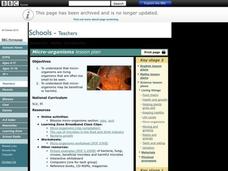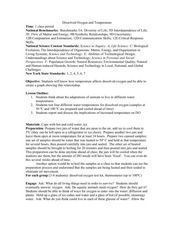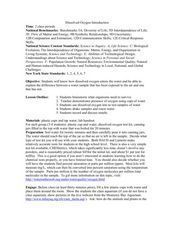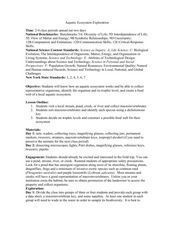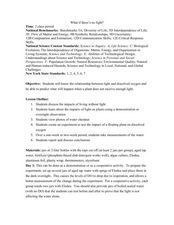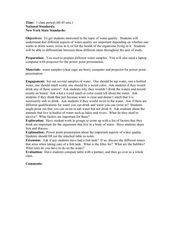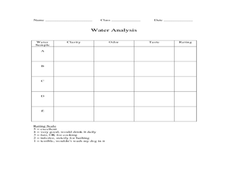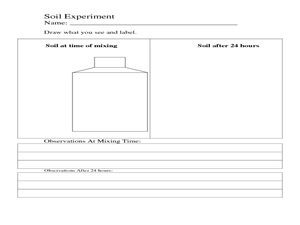American Museum of Natural History
Grow Rock Candy
The best way to study crystals is to make your own! A hands-on lesson shows learners how to make their own rock candy from household materials. While they watch the crystals grow, they discover their structure and can even eat their...
Curated OER
Making Your Own Sampling Tools
Students examine cause-and-effect relationship between human attitudes and behavior in the environment. They also assist citizens in increasing their sensitivity and stewardship for the environment.
Curated OER
Micro-Organisms
Students investigate microscopic life by viewing video clips. In this organisms lesson, students view photographs and video clips on the internet of micro-organisms and discuss the harms and benefits of the creatures. Students complete...
Curated OER
Layers of the Forest- Leaf Litter
Students conduct an experiment. For this temperate forest lesson, students discuss what kind of animal life can be found in the forest. They read The Magic School Bus Meets the Rot Squad: A Book About Decomposition and complete an...
Curated OER
Let's make a landfill
Students create a mini-landfill. In this decomposing lesson, students differentiate between materials that decay from those that won't. Students identify the factors that might help materials from decomposing. Students record on a...
Curated OER
Slash Trash! Reducing, Reusing and Recycling Our Way to Zero Waste
The other "Three Rs" are covered in this instructional activity: reduce, reuse, and recycle. Over four weeks, conservationists collect data about waste in their own homes. They combine their findings with those of other students in order...
Curated OER
Dissolved Oxygen and Temperature
Young scholars are shown how temperature affects dissolved oxygen and they create a graph showing this relationship. They think about the adaptations of animals to live in different water temperatures. Students test four different water...
Curated OER
Dissolved Oxygen Introduction
Students are shown how dissolved oxygen enters the water. They are taught the difference between a water sample that has been exposed to the air and one that has not. Students brainstorm what organisms need to survive. They use dissolved...
Curated OER
Is Our Water Healthy?
Students test water for a least one chemical characteristic. They hypothesize how a storm event might change the chemical characteristics of a stream. Students collect water samples and use the chemical test to test the water.
Curated OER
Zebra Mussel Population Simulation
Young scholars are taught how to format and enter data into an Excel spreadsheet. They make a graph, and interpret graphed data. Students discuss the possible impacts of zebra mussels on the Hudson river. They graph zebra mussel data.
Curated OER
Aquatic Ecosystem Exploration
Students visit a local stream, pond, creek, or river and collect macroinvertebrates. They sort macroinvertebrates and identify each species using a dichotomous key. Students decide on trophic levels and construct a possible food web for...
Curated OER
What If There's No Light?
students discuss the importance of light and the consequences of living without it. Using a plant as a demonstration, students predict and observe what happens to a plant when it does not receive enough light. In groups, they experiment...
Curated OER
Runoff: Intro to Watersheds
Students are taught that a watershed is, what types of basic land cover are impermeable and permeable to water. They trace the flow of water around their school and around their home. Students determine what watershed their school is a...
Curated OER
Invasives and Marsh Birds
Students are taught that invasive plant removal can have a variety of impacts. They are shown this by using graphs. Students view maps of vegetation change on Iona Island. They discuss implications of changes on marsh birds using data...
Curated OER
Water Chestnut Graphing Activity
Students are taught how to format and enter data into an Excel spreadsheet. They make a graph and interpret graphed data. Students discuss possible impacts of water chestnut invasion. They graph data on water chestnut. Students report...
Curated OER
Water Quality with Samples
Young scholars recognize whether one wants to drink water, swim in it, or for the health of the organisms living in it. They prepare different water samples to observe and collect samples regarding the water quality.
Curated OER
Bottled Water vs. Tap Water
Young scholars analyze the similarities and differences between tap water and bottled water. They make informed decisions about their use of each. Students are asked if they drink mostly tap water straight from the tap or water fountain....
Curated OER
Hudson Valley Rocks
Students identify each of the rocks provided and locate where in the valley they are found. They explain why the rocks came to be as they are in each location. In addition, they relate the exercise to how the Hudson Valley's geologic...
Curated OER
Glacial Groundwater
Young scholars study glacial deposition and groundwater in Dutchess County, new York. They identify the permeability rates in different glacial deposits and relate this information to ground water capacity of sediments found in Dutchess...
Curated OER
Trash Disposal Choices
Pupils investigate the use of landfills. In this landfill use and recycling lesson, students discuss what happens to trash and junk. They review the types of trash before categorizing a list of items they throw away each day. They...
Curated OER
The Rotten Truth
Pupils study the process of decomposition using lunch leftovers and soil. They complete the inquiry over set periods time as they observe the how composting takes place and finally, they sort the materials into biodegradable,...
Curated OER
Under Our Feet
Students investigate the forest ecosystem to learn of the living and non-living elements of the soil. In this ecosystem lesson, students examine soil for twigs, moss, fungi, leaves, roots and other matter. Students complete a...
PBS
Cloud Clues
It's cloudy with a good chance of learning! An inquiry-based lesson begins with an exploration of transparent, translucent, and opaque materials. Young scientists then connect their learning to the different cloud types as they take the...
Curated OER
Micro-organisms
Students learn what a micro-organism is. In this micro-organism lesson plan, students understand that micro-organisms may be too small to see. Students learn microorganisms could be bacteria, fungi, something beneficial or a harmful...




